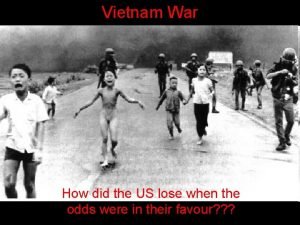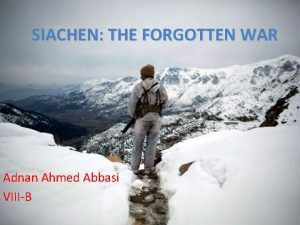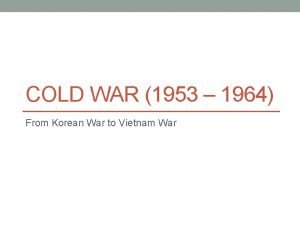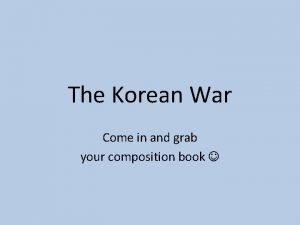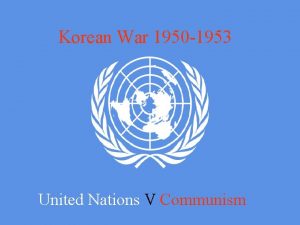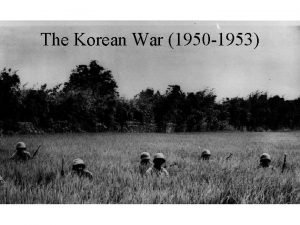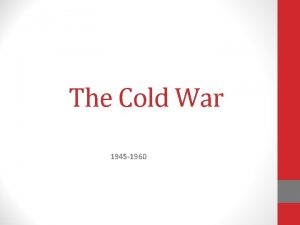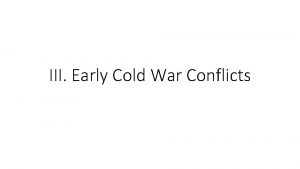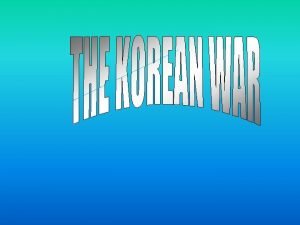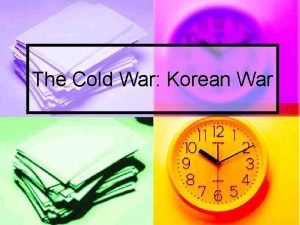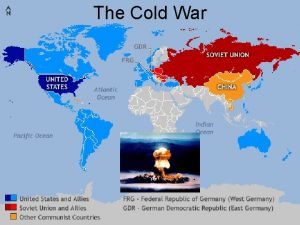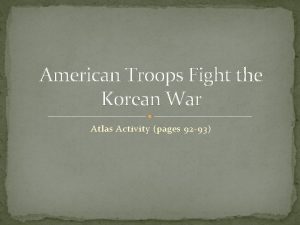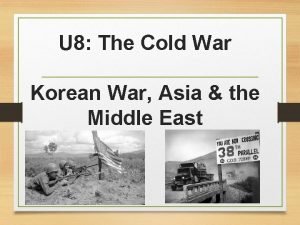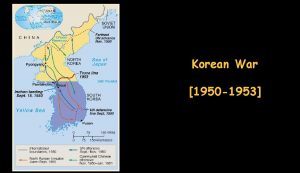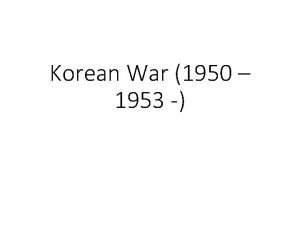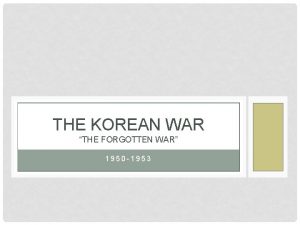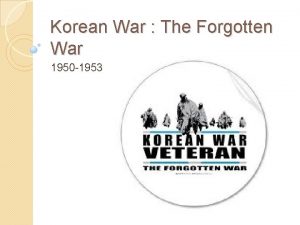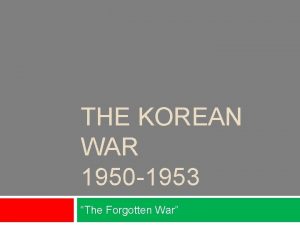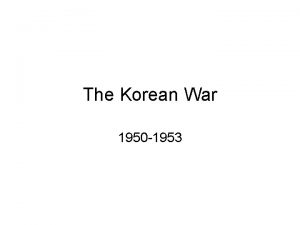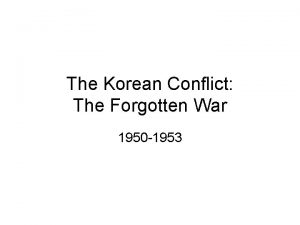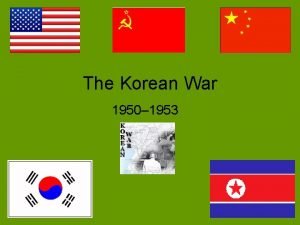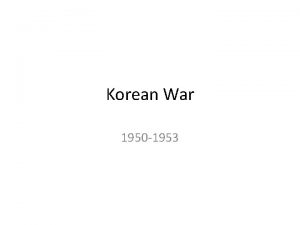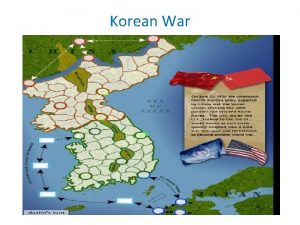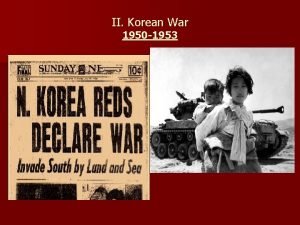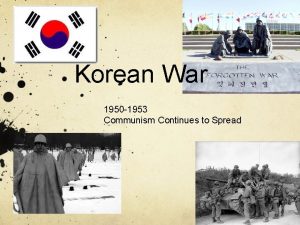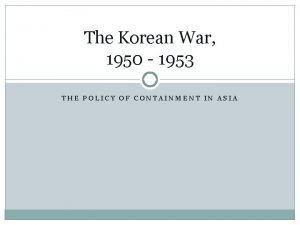The Korean War The Forgotten War 1950 1953
















- Slides: 16

The Korean War “The Forgotten War” 1950 -1953

Pre Korea • WWII ends in August 1945 • The most of Europe and Asia is trying to recover from the death and destruction. • The perfect opportunity for communism to spread its helping hands.

Democracy to the Rescue • Containment: – • Truman Doctrine: – • United States policy to prevent the spread of communism abroad. A component of the Cold War, this policy was a response to a series of moves by the Soviet Union to enlarge communist influence. In a speech given in 1947, President Truman announces that he will help support Greece and Turkey from falling into the Communist Sphere. https: //www. youtube. com/watch? v=p. D_ya. N R 7 k. HM Marshall Plan – – (June 1947): US Secretary Of State John Marshall’s plan to help struggling countries in Europe. 13 billion dollars in aid to countries who promised not to turn to communism.

China Falls 1949 • Led by Mao Zedong, with help from the Soviet Union, the People’s Republic of China is set up • Communist’s gain 1/5 of the world’s population. • Who is next to fall?

Korea • Korea used to be its own country and culture. • Japan invaded and took control of the country in 1904 thanks to the Japan-Korea Treaty. • When Japan surrendered in WWII in 1945 the US and Soviet Union decided to divide Korea in half at the 38 th parallel and temporarily occupy the once single country at an event Known as the Moscow Accords

North Korea • North Korea = Communist • Capital City: Pyongyang • Led by Kim Il Sung • Ally: Soviet Union

South Korea • South Korea: Dictatorship (non communist) • Capital City: Seoul • Leader: Syngman Rhee • Ally: United States

North Korea Attacks • Both leaders wanted control of the entire country. • Kim Il Sung Attacks the South in 1950 and takes most of the Country. • South Korea calls for aid from the UN. • When it came down to vote for action in Korea the Soviets Boycotted the meeting because of the nationalist Taiwan was being acknowledged as the true Chinese gov. excluding the PRC. With no Soviet Representation there was no chance for a veto in the Security Council. – UN army led by President Truman and Gen. Douglas Mac. Arthur – 36 countries, 520, 000 troops, 90% of them US troops. – S. Korea added 590, 000 more troops.

Battle at Pusan • The UN troops arrive in July of 1950 • UN and S. Korean troops cannot stop the N. Korean troops right away. • In August of 1950 Gen. Mac. Arthur finally stops the North Koreans next to the port city of Pusan on the Pusan Perimeter. – If the UN didn’t stop the North Koreans here the war would have been over.

Battle of Inchon • UN troops successfully surprise attack the North Korean troops with an amphibious landing on the Inchon coast behind enemy lines September 1950. – Heavy artillery, tanks, boats, and fresh troops. • UN troops captured the North and South rails and cut off North Korean food and supply while they were still in the south at Pusan. – Being Squeezed in from North at Inchon and south at Pusan the North Korean army was forced to retreat back passed the 38 th parallel. – UN troops push the communists all the way up to the Yalu River.

China Crashes the Party • Chinese did not want to share a border with a non-communist Korea. They wanted the North to stay red. • China sends and additional 300, 000 troops to help the North Koreans take back control • Gen. Mac. Arthur knows that this is a new war and asks for the use of nuclear weapons on Chinese cities, But Truman denies his request. • Chinese and N. Korean forces push the UN army back below the 38 th parallel and the War reaches a stalemate.

Mac. Arthur goes Mad • • Gen. Mac. Arthur still wants to take all of Korea and bring the war to China. He goes over the President’s head and begins to talk to Republican leaders about using nuclear weapons and fighting China. April, 11 th 1951 President Truman fires Gen. Douglas Mac. Arthur. American public was shocked and many disagreed with the president’s decision. – 69% of the US backed Mac. Arthur • • In New York at his farewell ceremony, he told the members of congress and the world "old soldiers never die; they just fade away. " In 1952 Dwight D. Eisenhower wins the presidential election.

Tie • In 1953 both sides sign an armistice to stop fighting. • The armistice lasted the entire cold war but a peace treaty was never negotiated • Korea remained two separate countries. • 67 billion dollars and nearly 55, 000 dead for the UN.

South Korea • After the Korean War, South Korea slowly rebuilds its economy. • By the mid 1960 s the economy leapt far ahead. • With a strong push from the middle class and student protests, they were able to push out the dictators and military rulers to transition in a democratic state.

North Korea • To this day N. Korea is still communist. • Kim Il Sung’s theory of self reliance kept their economy from growing and kept their people poor. • Sung created a personality cult and was glorified as a great leader – His son and grandson have done the same.

What you Learned • Write 2 -3 paragraphs on what you learned about and why this war is an important event in History. Was Communism contained successfully?
 Description
Description Reconstruction plans venn diagram
Reconstruction plans venn diagram War of the worlds 1953
War of the worlds 1953 Siachen the forgotten war
Siachen the forgotten war The korean war
The korean war Cause of korean war
Cause of korean war Korean war
Korean war Cause of korean war
Cause of korean war Korean war map
Korean war map Causes and effects of the korean war
Causes and effects of the korean war Korean war
Korean war Korean war cause
Korean war cause Rollback cold war
Rollback cold war Cause of korean war
Cause of korean war Agent orange map korea
Agent orange map korea American troops fight the korean war 48a answer key
American troops fight the korean war 48a answer key Korean war webquest
Korean war webquest
